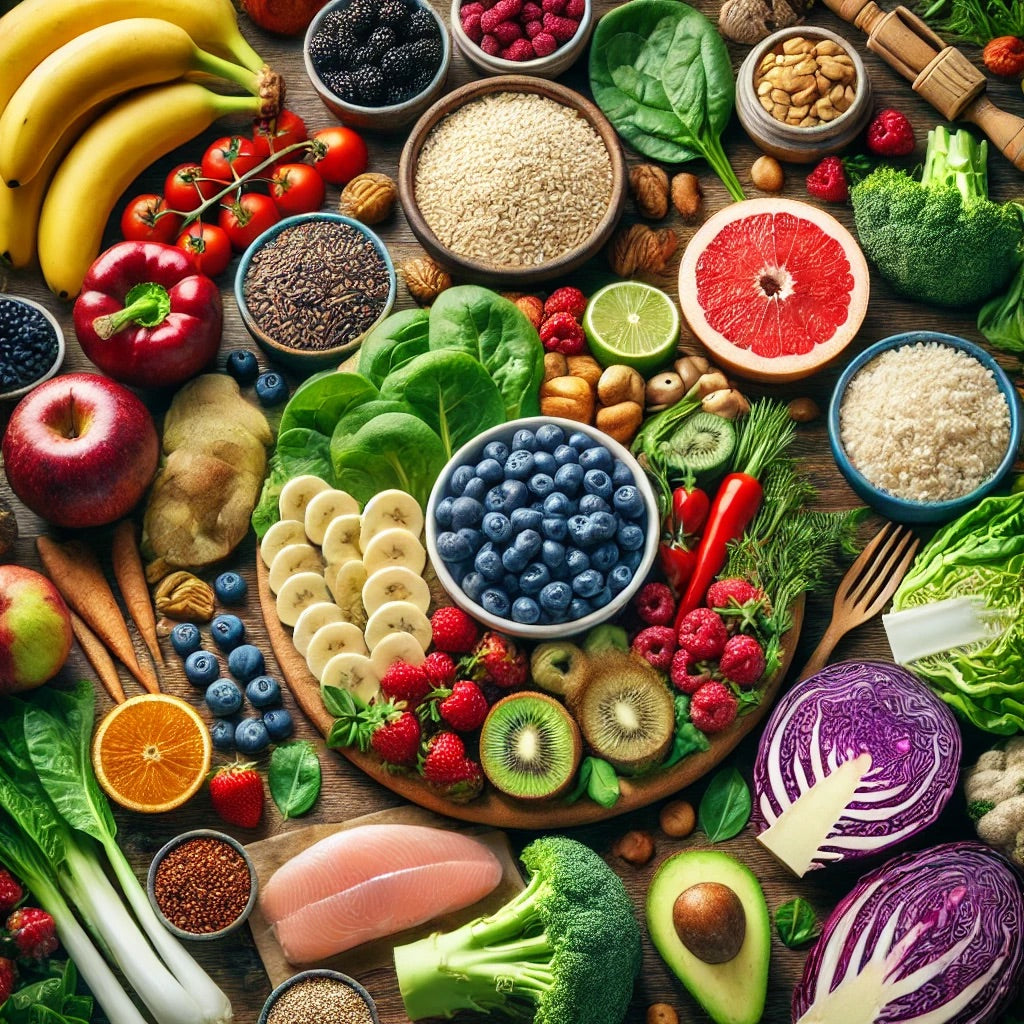
Comparing DASH, Keto, Paleo, and Plant-Based Diets: Which is Best?
Share
In recent years, various diets have gained popularity for their potential health benefits. Among these, the DASH diet (Dietary Approaches to Stop Hypertension), Keto diet, Paleo diet, and Plant-Based diet stand out for their distinct approaches to nutrition. This article will compare these four diets, exploring their principles, benefits, and potential drawbacks to help readers understand which might align best with their health goals.
Overview of Each Diet

-
DASH Diet:
- Focus: Primarily designed to lower blood pressure, the DASH diet emphasizes whole foods, particularly fruits, vegetables, whole grains, and lean proteins while minimizing sodium intake.
- Key Components: Encourages 4-5 servings of fruits and vegetables, 6-8 servings of whole grains, low-fat dairy, nuts, and healthy fats.
-
Keto Diet:
- Focus: The Keto diet is a high-fat, low-carbohydrate diet that aims to induce a state of ketosis, where the body burns fat for fuel instead of carbohydrates.
- Key Components: Typically consists of 70-75% fat, 20-25% protein, and 5-10% carbohydrates. Foods include avocados, fatty fish, nuts, seeds, and low-carb vegetables, while grains and sugars are heavily restricted.
-
Paleo Diet:
- Focus: The Paleo diet promotes eating foods presumed to be available to our prehistoric ancestors. It emphasizes whole, unprocessed foods while eliminating grains, legumes, dairy, and processed sugars.
- Key Components: Consists of lean meats, fish, fruits, vegetables, nuts, and seeds, with a focus on organic and grass-fed options.
-
Plant-Based Diet:
- Focus: The Plant-Based diet centers on foods derived from plants, including fruits, vegetables, whole grains, legumes, nuts, and seeds. It can be flexible, allowing for occasional animal products.
- Key Components: Emphasizes whole foods and minimizes processed foods, with a focus on health rather than strict elimination of animal products.

Comparisons and Overlaps
-
Common Principles:
- Whole Foods Focus: All four diets prioritize whole, minimally processed foods, promoting nutrient density and reducing unhealthy additives.
- Health Benefits: Each diet offers potential health benefits, including weight management, improved heart health, and reduced risk of chronic diseases.
-
Unique Characteristics:
- DASH Diet: Primarily designed for hypertension management, emphasizing a balanced intake of nutrients, particularly potassium and magnesium.
- Keto Diet: Focuses on drastically reducing carbohydrates to promote ketosis, which may be beneficial for weight loss and managing epilepsy but can be restrictive and challenging for some individuals.
- Paleo Diet: Emphasizes a return to ancestral eating patterns, excluding entire food groups (grains, legumes, and dairy), which can limit some nutrients and dietary variety.
- Plant-Based Diet: Offers flexibility in including or excluding animal products, focusing on health and ethical considerations, promoting a broad spectrum of nutrients from plant sources.

Health Benefits and Evidence
-
DASH Diet: Numerous studies have demonstrated its effectiveness in lowering blood pressure, improving cholesterol levels, and supporting heart health. It is often recommended as a first-line dietary approach for hypertension.
-
Keto Diet: Research indicates that the Keto diet can lead to significant weight loss, improved blood sugar control, and enhanced mental clarity for some individuals. However, long-term effects and sustainability are still under investigation.
-
Paleo Diet: Studies suggest that the Paleo diet can promote weight loss, improve metabolic health, and reduce inflammation. However, the exclusion of whole food groups may lead to nutrient deficiencies if not carefully managed.
-
Plant-Based Diet: Extensive research shows that a well-planned plant-based diet can lower the risk of heart disease, diabetes, and certain cancers. It is associated with lower body weight and better overall health outcomes.
Potential Drawbacks
-
DASH Diet: Some may find the focus on sodium reduction challenging, particularly if they are accustomed to a high-sodium diet. It may require careful meal planning to ensure all nutrient needs are met.
-
Keto Diet: The restrictive nature of the Keto diet can make it difficult to maintain long-term. It may lead to nutrient deficiencies if not properly balanced and can cause side effects such as fatigue and digestive issues, often referred to as "Keto flu."
-
Paleo Diet: The exclusion of grains and legumes can limit fiber intake and some essential nutrients. The emphasis on meat can have potential health drawbacks.
-
Plant-Based Diet: While the diet is flexible, individuals may struggle with obtaining all essential nutrients (such as vitamin B12, iron, and omega-3 fatty acids) if not adequately planned.

Which Diet is Right for You?
Choosing the right diet depends on various factors, including personal health goals, lifestyle preferences, and any existing medical conditions. For individuals looking to lower blood pressure or improve heart health, the DASH diet may be the best fit. Those seeking rapid weight loss or specific metabolic benefits might find the Keto diet effective, while individuals interested in a more natural, ancestral eating approach could prefer the Paleo diet. The Plant-Based diet is ideal for those wanting a flexible, health-focused diet that prioritizes plant foods and can adapt to ethical considerations. Consulting with a healthcare provider or nutritionist can also provide personalized guidance based on individual needs and circumstances.
Putting it into Practice
Each of these diets offers unique approaches to nutrition, with distinct benefits and potential drawbacks. The DASH diet is particularly beneficial for those looking to manage blood pressure, while the Keto diet may appeal to individuals seeking rapid weight loss. The Paleo diet emphasizes a return to ancestral eating patterns, and the Plant-Based diet provides a flexible, health-focused approach. Ultimately, the best diet for an individual depends on their personal health goals, lifestyle, and preferences.
By understanding the key principles and health implications of these diets, readers can make informed choices that align with their nutritional needs and well-being.
